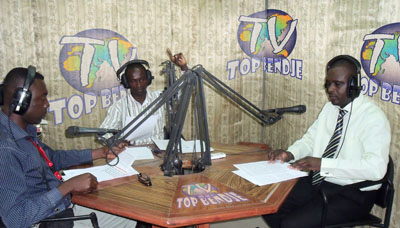In Gabon, more than a year after the historic and contested presidential elections won by Ali Ben Bongo Ondimba, the main radio and television stations of Ondimba’s two main opponents still face administrative obstructions imposed during the polls, according to interviews CPJ conducted with journalists and officials between July and September.
On September 3, 2009 came the announcement of official results from the August 30 polls, declaring Ondimba the winner of the race, ahead of former Interior Minister André Mba Obame and veteran opposition leader Pierre Mamboundou. The announcement triggered violent demonstrations in Port-Gentil, the economic capital and the main seaport of export for the oil wealth of this nation of 1.5 million in equatorial Africa.
Jonas Moulenda of the state daily L’Union reported from the city’s streets during deadly clashes between demonstrators and security forces. He told CPJ that the poverty of the local population explained popular dissatisfaction with the 41 years of rule of Ondimba’s late father.
At the time of the elections, three broadcasters were sharing the airwaves of Port-Gentil: Radio Mandji, the local affiliate of state network Radiodiffusion Télévision Gabonaise, Canal Delta, a more or less neutral privately-owned radio station, and Radio TV Top Bendje of Séraphin Ndaot, a former mayor of Port-Gentil who is close to opposition leader Mamboundou, according to CPJ research.
When violence broke out on September 3, Radio Mandji Director Michel Wora Duchateau “disconnected” Bendje’s transmitters from the broadcasting tower of Gabon Télécom in Port-Gentil’s southern neighborhood of Matanda–where all of the local broadcasters are connected–“against all odds and without any notice, making them non-functional.”
Duchateau then “changed the locks of the premises to make them inaccessible” and placed one of his agents on guard duty, “with the instruction to prevent any access by the technicians” of Bendje.
These statements appeared in a March 11 decision of the Appeals Court of Port-Gentil, which declared the acts “unlawful” under Gabon’s 2001 press law and ordered the immediate end of any obstruction to Bendje’s technicians. The judge slapped Duchateau with a daily fine of 100,000 CFA francs (U.S. $210).
“Radio Top Bendje is back on the air, but the damage is still there, and must be repaired,” Homa Moussavou, Bendje’s lawyer, told CPJ in July. The moral, material and commercial damages amounted to 268,700,000 CFA francs (US$551,000), he said. In June, Moussavou filed a demand for payment of damages in a court of first instance in the capital, Libreville. It was addressed to Communications Minister Laure Olga Gondjout.
Gondjou admitted responsibility for censoring Bendje in a December 10, 2009 letter to the Gabonese premier. “This radio station, due to the opposition stance of its owner, has broadcast programs inciting hatred and violence,” the letter said. “Unfortunate events in Port-Gentil were caused by this outlet,” the letter went on. “To preserve national unity and social cohesion, the director [Duchateau] on my instructions interrupted the broadcasts, in order to prevent the country from sinking into civil war.”
In interviews with CPJ, Bendje’s officials denied these accusations. Bendje’s broadcasts, while advocating for change in favor of opposition candidates, did not incite violence, Moulenda told CPJ. He added that the station had the most listeners during the elections.
In early September, CPJ contacted by phone Communications Minister Gondjout to give her an opportunity to comment on her role in the Bendje case. At her request, CPJ sent her by fax and email an official interview questionnaire. By the date of publication of this story, Gondjout had not responded to our inquiry.
The case is now pending before a tribunal of first instance in Libreville. While awaiting justice, Bendje invested in its own broadcasting tower, ending its dependence on the Gabon Télécom mast, reporter Madzou Vianney-Presley told CPJ.
For TV+, a station founded by Ondimba’s top rival, former interior minister Obame, its broadcasting radius has been reduced to the capital Libreville since last year. On the evening of August 30, 2009, TV+ lost its signal at around 8 p.m. when the channel was rebroadcasting an interview with Ondimba’s father, in which the late leader discussed his succession.
The same night, armed commandos opened fire on the installations of TV+ and Go Africa, an affiliate station, in the City of Democracy in Libreville, an administrative area upon a hilltop that strictly secured by the president’s Republican Guard.
“Our broadcast site is still under the control of the army, which prevents us from accessing it. We managed to resume our programs with an alternative transmitter that emits in a smaller [broadcasting] radius and cannot reach other cities,” Jean Pascal Ndong, Director General of Radio Nostalgie, a station belonging to TV+’s B.O. Communication, told CPJ. Prior to the elections, the station covered the entire territory of Gabon, but now broadcasts only in the capital over a radius of about 30 kilometers (19 miles), he said.
As in the case of Bendje, a Ministry of Communications official appears to be involved with the interruption of TV+’s broadcasts. According to several journalists, Christophe Othamot, the secretary general of the ministry, stands accused of ordering the disconnection of TV+’s transmitters from the masts of Gabon Telecom across the country.
Othamot denied the allegations in a September 2009 interview with Agence France-Presse. “The ministry denies any involvement in dismantling TV equipment,” he said. Othamot did not return CPJ’s repeated calls for comments.
During the elections, other media outlets, including pan-African satellite broadcaster Africa 24 and the bimonthly Tango, also accused Othamot of involvement in media censorship, according to CPJ research.
“We filed a complaint and are waiting for developments. Today, we are not using one-tenth of our potential and, after 11 years of broadcasting, the majority of our partners have left,” declared Ndong, indicating that he had commissioned an investigation with a bailiff. The case has not been heard yet.
